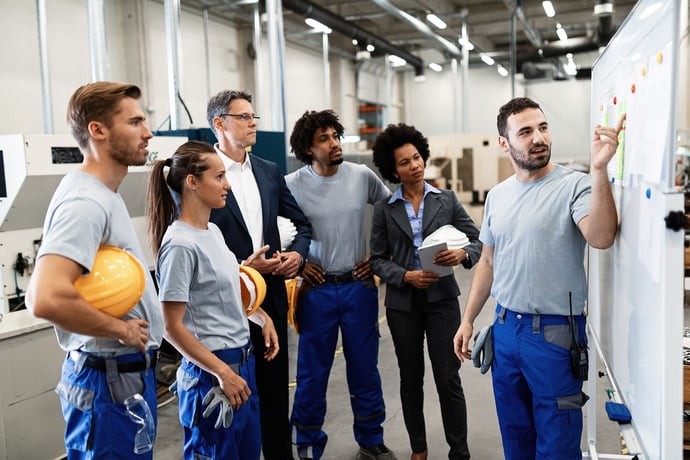When it comes to a workplace environment, nothing can be more challenging than navigating differences in generational work styles. With the silver tsunami prevalent in manufacturing, the need to encourage a younger generation of employees to pursue a career in manufacturing is critical. Yet, working together productively is key and generations don’t always speak the same language when it comes to co-existing in the workplace. Erin Courtenay from Earthling Interactive in Wisconsin led a discussion in USA Manufacturing Hour Chat on Twitter about this topic.
Advantages of Different Generations Working Together
The discussion began with exploring the advantages to having different generations work together in the same workplace. Participants had opinions.
Rebecca Prox from DSI/Dynamic in Wisconsin said, “Perspectives! There is a lot we can learn from other generations. Older gens have a lot of experience, younger gens have fresh eyes, etc.”
Kelley Plats from North American Coating Laboratories in Ohio said, “You have both historical knowledge and new perspectives in intergeneration teams! Plus they tend to challenge each other to create better solutions for your customers! The best ideas come from working together with people who have different life experience!”
Shannon Simpson from DuraTech Industries in Wisconsin said, “All bring different experiences, skills, life skills, and education to the workplace. Diversity provides great group dynamics.”
Julie Basello from Radwell International in New Jersey said, “People can learn from each other's varying skill sets and experience levels.”
Ruby Rusine from Social Success Marketing in California said, “It promotes the sharing of best practices and different perspectives.”
Gina Tabasso from MAGNET, Manufacturing Extension Partnership in Ohio said, “Diversity, different perspectives.”
Dondi Scumaci, an Author and Speaker from Texas said, “ There are also great opportunities for two-way mentoring. It's fabulous when we can make that intentional. The age differences can make us much more diverse in our approaches.”
Jeanette Stevens from GenEdge Alliance in Virginia said, “Great question, #1 is experience, there is so much to learn from people of different generations. Work styles, skills and habits.”
 John Buglino from Optessa Inc in New Jersey said, “Varying perspective and times when people arrive/leave for the day.”
John Buglino from Optessa Inc in New Jersey said, “Varying perspective and times when people arrive/leave for the day.”
Velavu Tech in Canada said, “Mentoring! It's so rewarding for both the mentee and the mentor.”
Dan Bigger from Custom Profile in Michigan said, “Perspective. The old time thought is, "this is how we have always done it." I hate that. A fresh perspective is needed to move things forward. There are always other ways to grow.”
Ben Nordman from Obsidian Manufacturing Industries in Illinois said, “Different ideas and thought processes! We all know there are certain differences between generational work styles and though processes and combining them can make for a great work environment with the right management.”
Mike Womack from NJMEP in New Jersey commented, “Couldn't agree more! Well said. We were right there with you. Hope you've been well!”
Rusine added, “Couldn't agree more.”
Manufacturers’ News, Inc. said, “We employ several generations, with employees in their 20s to employees in their 90s! What we've seen is this sets up an incredible learning dynamic with employees benefiting from the knowledge of other generations.”
Will Healy, an Engineer from Ohio said, “Tribal knowledge is more easily passed and transferred to the new workforce, if done right, we can put the older generations in positions where their knowledge has value and we expect less physical demands on them and put young people in place to learn & support!”
VirtuDesk said, “Those in older generations serve as a teacher for the younger ones. Knowledge coming from them is gold. The younger ones are important so you can pass on your company traditions and workplace culture.”
Nigel T. Packer from PelaTis Online in Wales, UK said, “A business is like and extended family, it takes everyone to create a cohesive unit. You might not always get on, the older generation educate and look after the young until it is time for the young to look after the old.”
Felix Nater from Nater Associates in North Carolina said, “The truth of the matter is that passing and transferring of technology and insight happens at a greater pace than it did for us 'young folk’.”
Rusine added, “Change is inevitable in life, per se. Not even an option. You have to “arrive” to it at one point, the question is how soon/late do you want to get there.”
Host Courtenay felt a major advantage was experience. She said, “Diversity in experience and knowledge strengthens the workplace. When you learn from one another you grow as individuals and as a company.”
Technical and Computer Skills
Next the discussion turned to technical and computer skills. Host, Courtenay asked if technical/computer skills are limited to just the “younger” generations? Participants checked in.
Tabasso answered, “ Heck no. We invented them. We are the first adopters and have to adjust and pivot to stay relevant and current.”
Brash Inc said, “I don't think anything is limited to any age group. Sure, the younger gens like millennials and gen z grew up with the digital revolution so it comes pretty naturally to that age group (speaking as a millennial) but it's about desire to learn and access.”
 They added, “But HOW the technology is used is definitely different, which comes from just lived experience.”
They added, “But HOW the technology is used is definitely different, which comes from just lived experience.”
Stevens added, “Absolutely not. Older generations whether or not they lived through the technical revolution, still have the skills and propensity to learn. Boomers may have programming knowledge, Gen X acquired programming and use knowledge, Millenials use, new perspective.”
Plats said, “Yes and No. While "younger" generations are a bit more adaptable to fast changing tech space, but don't count out the "older" generations! They are willing to learn just as much as the next person!”
Kati McDermith from Industry Net in Illinois said, “ I don't think so. I think technology is getting more user friendly. "older" generations find such value in it! I volunteer in my small neighborhood as the "IT Girl" and the elderly and disabled folks are feeling more comfortable with technology.”
Host, Courtenay said, “That's wonderful! I love hearing that you are helping with your "young" skills!”
Bigger said, “No, we are all learning and there is no reason we cannot continue to learn from one another. What somebody is good at somebody else may not be. Share information and grow and learn from everyone.”
Dana Engelbert from Mississippi said, “Absolutely not! My dad is a baby boomer and built computers and ran a network center before retiring. The difference may be in adoption of different kinds of tech, approach.”
Healy added, “My impression is when you have had a certain technology present during your entire formative/developmental life, your skill with it will always be stronger than someone who is learning it in their adult life... right or wrong.”
Host Courtenay answered, “ I wonder if that's true when it comes to harder or "lower" tech, closer to coding. With such amazing UI these days, kids don't have the same insight to the inner workings?”
Gail Robertson from Gail Now in Canada said, “Not! It is mindset not only age. In Manufacturing / a lot of shall we say more mature people - really rocking using tech, automation. Some of us also have the experience of going through change / knowing we have no option but to adapt So yes. Mindset.”
Scumaci added, “I think we all come to the table with assumptions about people. These are based on our experiences, but so limiting. To be really good at this, we need to agree to shed the stereotypes.”
Buglino added, “No - usually those with tenure show the new/'younger' crowd the ropes.”
Nordman answered, “No, but there is likely a larger learning curve for older generations. The younger generations you're most likely referring to have grown up with this type of technology, whereas the older generations had to adapt as adults.”
Tabasso replied, “Not true. I ran circles around our agency of 20-somethings when building out instances in Act-On and webpages in Umbraco. I learned as I went. Never did it before. I also built out and managed WordPress sites that my agency couldn't do. That's a tech stack!”
Bethany Bigelow from Home Building Solutions in Michigan said, “I know plenty of older folks that know their way around a computer! Nigel Packer and his wife are perfect examples.”
Manufacturers News said, “Not at all! Although we have some older employees who are not as comfortable with tech, we also have some who love it and are constantly learning new things and helping us advance.”
Healy added, “My 3 year old son will have had "voice-interface" AI (like Alexa/Siri/Google) present during his entire lifetime... how could his skill with voice-interface-AI not be better than mine when he grows up... “
Host Courtenay answered, “ As AI improves to the point of natural language - are critical thinking skills actually more useful than "technical skills"?”
Rusine said, “No, for sure as tech evolves, so do different skills and tasks...there are tasks/skills that either can do well in a business environment.”
Host, Courtenay said, “Anyone can build their skills in technology. Being younger doesn’t automatically make you better at tech, just more familiar. Lots of great tech is built by people over 50.”
Open to Change
The chat continued with a discussion about how important is it to be open to change. For example: using new technology, new styles of communication, or new standards. Participants had some definite opinions.
Tabasso said, “Imperative.”
Bigger said, “ Very, I am always learning something new from the people that I work with and these types of groups. My new job uses teams, never used it before, but I am figuring it all out as I go to be able to communicate with our team.”
Womack said, “Change is constant regardless of a generation. Completely agree with Dan Bigger. It is very important to be open to change. To continuously improve, change is required.”
Womack added, “It takes is a little willingness to be uncomfortable. That's when growth happens and it can happen at any age. Younger generations have so much to learn from all that experience accumulated over a long career. Change is the constant that we all need to embrace!”
Kirsten Austin from DCSC Inc in Missouri said, “I think change is very important. It does, however, need to be balanced with whatever structure does serve your company well. Sometimes there are reasons companies are still successful.”
Prox said, “If you want to be relevant in your industry/career, it's important to be adaptable to whatever is needed for continued growth.”
Plats said, “It's not only important, it's essential. Communication styles are rapidly changing. Face to face meetings are less common, often times email & texts replace a call, and we have to be willing to adapt to those changes to continue to develop and grow.”
Austin replied, “You know you're right there. If I call my 25 year old niece I really don't hear from her. Text? She's back with me in warped speed.”
Buglino said, “Adaptability is key for any organization wishing to succeed & grow. Saying "We've always done it this way,' has no place in the world today.”
Stevens said, “Information and technology move extremely fast. Change is not only inevitable, but it is essential in today's environment. As they say if, if you cannot change you'll be left in the dust.”
Healy said, “The only constant in life is change. You must always adapt.”
Manufacturers News Inc said, “For us, it is imperative. We started out as a print publisher more than 100 years ago. In order to stick around this long we had to pivot, change, grow and adapt to changing technology and the changing needs of our customers.”
Bigger said, “ And you are doing great.”
Stanley Waite in Australia said, “Learning something new is always useful, but knowing where to use it can be the challenge.. as every company has different needs.”
Pavel Stepanov from VirtuDesk said, “Change is the only permanent in this world. If you will close your doors, you will never grow.”
Nordman added, “I think adaptability and malleability are two of the most important qualities to have when talking about work styles. Being open to new ideas and bringing an objective look at any idea given to a person is essential to being successful.
Host, Courtenay said, “It is more important than ever to be open to change, because everything is changing so quickly these days. Be willing to make mistakes and to learn.”
Attracting A Younger Generation
Participants next discussed what qualities of the manufacturing sector they think attract a younger workforce.
Plats said, “As a "younger-ish" member of the workforce, what worked for me was one of my sorority sisters telling me to move to manufacturing. Word of mouth works in the professional world! What has kept me is the support, stability, and continuous growth opportunity!”
Austin said, “I wish more young people knew this! So many jobs. Project Management, Marketing, Development, Engineering, Process Improvement etc. Young people, there are many manufacturing jobs that are going unfilled and it will grow.”
Prox said, “We need to keep trying to get the word out!!” She added, “Higher pay, less education needed to get started, hands-on opportunities, the chance to be part of something that has high reward (career advancement, sense of accomplishment, etc.)”
Bigger said, “Automation and new tech. They want to be on the forefront of the change and have a hand in the "new" to provide their stamp on growth and change.”
Simpson added, “AI for sure. More HI- Tech machines than in the past.”
Scumaci said, “I think the elements that connect with and inspire one's strengths and values. Maybe the chance to change the world (or a tiny corner of it). Maybe the opportunity to use one's gifts and talents.”
McDermith said, “From the mouth of my son, "Why would I go into debt for a career that won't allow me to make use of my so-called riches, when I can go right into the foundry with all the benefits and have money to save and time to spend enjoying my toys"
Stevens said, “Innovation, little fringe benefits, flexibility and a liveable wage. There also has to be meaning behind the work, which the manufacturing industry can boast plenty.”
Tabasso said, “Money and tech.”
Nordman contributed, “I think doing a variety of jobs day-to-day is important. There's a lot of research out there about attention spans of the younger generations being shorter and being able to do something new every day could counter that.”
Buglino said, “Innovation & relevance to products used each day. cell phones, tablets, & other tech”
Engelbert said, “There are a couple of things I see as attractive to those kids. (Ha!) Being able to work with you hands, to be creative. (Love the Creators Wanted campaign!) And not needing to go into epic debt to have a career.”

Manufacturers News Inc said, “Manufacturing is just so exciting and is becoming more so by the day. Robotics, materials science, 3D printing, iiot... There are so many great career opportunities. Plus, the reward of looking at the final product and thinking: "Hey, I made that happen."”
Engelbert added, “Also the plethora of tech opportunities - robotics, modeling, CAD, AI.”
Healy said, “Disruptive Technologies.”
Nater said, “I might also add that employers are stuck with a mix of employees unwilling to adapt, stuck in our ways, judgmental, and opinionated to the point of stereotyping and shutting down meaningful dialogue.”
Host, Courtenay said, “The opportunity to make things, to build, and to be a part of something bigger than yourself. Continuous learning and a sense of community.”
Stereotyping
The chat then turned to the question of how stereotyping generations can cause friction. Participants shared their thoughts.
Tabasso said, “It introduces the concept of unconscious bias, which is an erroneous way of thinking.”
Stevens said, “Assumptions that can ruin relationships before they start which is a shame.”
Bigger said, “No stereotype works for anything. We are all individuals and that is how we should all treat each other. This is where things can go south in anything. Don't judge, learn, understand and teach one another.”
Simpson said, “When you stereotype, you cast doubt on people's abilities. It is belittling. It causes one's own self to have doubt and anger toward the other co-workers or leaders.”
McDermith said, “Because stereotyping at all is kind of gross. But sometimes we forget we are improving upon the innovations that came from our fathers and grandfather's necessity.”
Prox added, “It leads to bias. Period.”
Plats said, “We use the generational terms as insults and forget that we are all people with valuable experience. We use terms like "boomer" and "millennial" as insults instead of showing each other respect. Gen X is typically left alone, they're tired of our nonsense!”
David Crysler from The Crysler Club said, “It shows you’re not open to change, ideas, or leaning. Nothing will kill an organization faster than their culture.”
Buglino said, “Easiest way to cause a divide within an organization. You get an 'us vs them' mentality which is hard to change.”
Val from Monofrax in New York said, “Stereotyping is a break in communication. Communication is what keeps processes moving in manufacturing.”
Stepanov said, “Because it is offensive. We tend to generalize people based on their categories which doesn't truly show the personality of individuals. If they like coffee in general, this doesn't mean you are into coffee too. We are all unique.”
Host Courtenay said, “Making assumptions about a person based on their age or what you’ve “heard” about people their age can lead to misunderstandings and missed opportunities.”
 Recommending Manufacturing
Recommending Manufacturing
Next the discussion turned to whether people would encourage their children or younger family members to go into manufacturing and what the reasons were behind their respective opinions.
Simpson said, “Absolutely. And we do. Both of our boys. I don't think any of us would be here if we would not.”
Tabasso said, “I also teach college and sometimes (shh don't tell the college) encourage students to consider manufacturing careers. Often kids are not college ready and feel like failures. They are pushed in this direction. We need to educate parents first.”
Courtenay said, ”Yes! School children today are learning so much that can be applied to manufacturing. Maker spaces, robotics, STEM… it is all leading to great opportunities for the future.”
Scumaci said, “ABSOLUTELY! Paths are very personally things. Our job as Parents, Mentors and Advocates is to help people find their lane - a place they can open, explore and use their unique gifts.
McDermith said, “OMG Every. Day. All. Day! I don't think I needed to answer this one.”
Buglino said, “100% YES. One of the most exciting fields to work in + majority of the roles are there to stay.”
Prox said, “That's a serious point right there. Manufacturing jobs aren't going anywhere anytime soon!”
Plats said, “100% without hesitation! It is challenging, fulfilling, fun, and every day you do something a little bit different! I also feel like I'm making a tangible contribution! Plus it has allowed me to have amazing work-life balance!”
Stevens added, “100% its rewarding, needed so longevity, its evolving, which means room for innovation, it adds to our country economically and the money is there.”
Crysler said, “Without hesitation! We’re a world of consumers so we’ll always need more stuff made. That’s what manufactures do best!”
Engelbert said, “Absolutely. Having that conversation now.”
Bigger added, “All of the time. I talk to my kids everyday about the jobs I am working on and what I do. I am working on my 2 boys to become engineers. I have 1 sold and am working on the others. My youngest daughter is a mystery so far. My oldest will be an artist.”
Manufacturers News Inc said, “100% YES There are so many career opportunities in manufacturing.”
Universal Values
The last discussion point was about values and participants were asked to share what values they think are universal across generations.
Bigger said, “Great question. We all want to be appreciated for what we do, challenged, and make a difference at the end of the day.”
Prox said, “Respect, camaraderie, kindness, adaptability, passion for the work... to name a few.”
Tabasso said, “A desire to be treated well (whatever that may look like to each generation) and earn a good living.”
Plats said, “Kindness, Trust, Respect, Sense of Humor, Trust. I think the generations are more alike than they think!”
Stepanov said, “Respect, kindness, and trust.”
Healy said, “Innovation Determination Wanting to Make the World a Better Place.”
Engelbert said, “Maslow's hierarchy of needs, ranging from basic food shelter through fulfillment.”
Stevens added, “ Good culture, learning environment, trust, growth.”
Simpson added, “I agree with everyone's answers. Gene and I are from different generations. But we share the love and learn from each other.”
Bigger quipped, “Sharing is caring.”
McDermith said, “I'll agree with fairness. That's about it. And even there I am a bit pessimistic.
VirtuDesk said, “ We’ll go for trust and love.”
Packer added, “Appreciation.”
Buglino said, “Respect and kindness.”
Austin said, “Patience.”
Manufacturers News Inc said, “Great question -Diligence -Kindness -Respect.”
Host Courtenay said, “Family, hard work, and fairness are important to everyone. We may have different ways of approaching them, but at the core we are the same.”
For the manufacturing community, growth and future operational excellence will rely on successfully navigating generational styles and encouraging a younger generation of employees to join the team. When generations can learn from one another and not focus on differences, they can cohesively partner up in the workplace. Working together makes success imminent.
About #USAMfgHour
Anyone who champions U.S. manufacturing can join in on a new conversation each week on Twitter using the hashtag #USAMfgHour. The chat starts at 11 a.m. Pacific Standard Time/2 p.m. Eastern. Share positive blog posts, helpful articles, news, important information, accomplishments, events, and more with other manufacturers and supporters from throughout the country.
Are you interested in hosting a #USAMfgHour chat? Contact organizers @DanBiggerUsaMfg, @DCSCinc, @SocialSMktg and @Radwell_Intl
